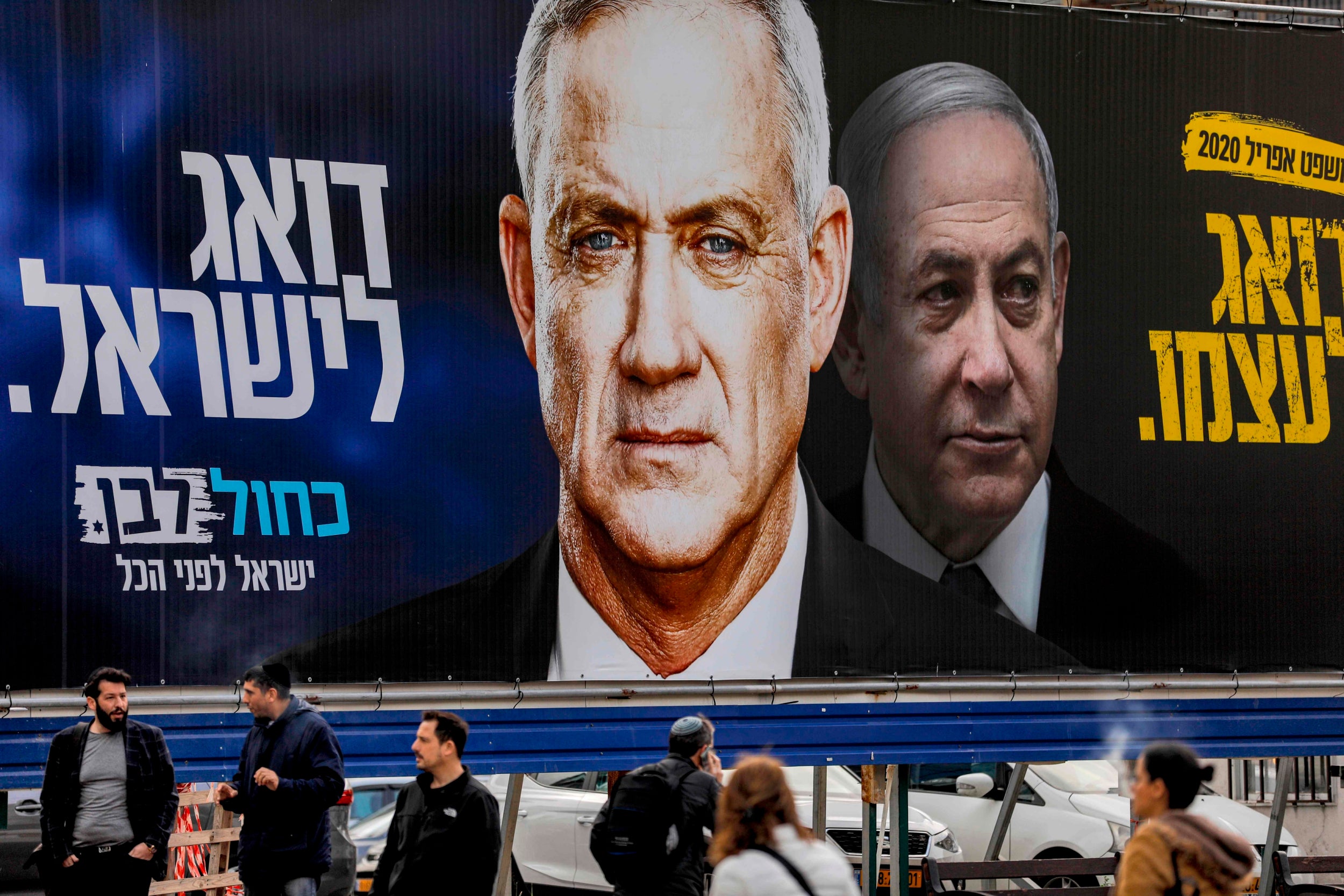Israeli president tasks Benny Gantz with forming government in damning blow to Netanyahu
Just weeks after declaring victory, Netanyahu faces possibility his chief elections rival may be able to form the next government

Your support helps us to tell the story
From reproductive rights to climate change to Big Tech, The Independent is on the ground when the story is developing. Whether it's investigating the financials of Elon Musk's pro-Trump PAC or producing our latest documentary, 'The A Word', which shines a light on the American women fighting for reproductive rights, we know how important it is to parse out the facts from the messaging.
At such a critical moment in US history, we need reporters on the ground. Your donation allows us to keep sending journalists to speak to both sides of the story.
The Independent is trusted by Americans across the entire political spectrum. And unlike many other quality news outlets, we choose not to lock Americans out of our reporting and analysis with paywalls. We believe quality journalism should be available to everyone, paid for by those who can afford it.
Your support makes all the difference.Israel’s president has instructed ex-army chief Benny Gantz to form the country’s next government after three inconclusive elections, in a devastating blow to Benjamin Netanyahu who had declared victory just two weeks ago.
Mr Gantz, who leads the centrist Blue and White alliance, has up to 42 to days to try to complete the formidable task of building a ruling coalition which, if successful, would depose Mr Netanyahu, Israel’s longest-serving prime minister.
Mr Netanyahu, who has been premier since 2009, was due to stand trial this week across three corruption cases, which has dented his popularity. However, the legal proceedings have been put on hold due to coronavirus restrictions on large gatherings.
His chief elections rival Mr Gantz, meanwhile, secured promises of support from enough members of the 120-member Knesset to form a knife-edge majority of 61 seats.
But they include several parties who are fiercely ideologically opposed – including the Joint List of largely Arab parties as well as the far-right party of ex-defence minister Avigdor Lieberman. It has raised serious doubts about how successful he will be in translating those pledges into a functioning coalition.
At a televised ceremony, President Reuven Rivlin gave Mr Gantz 28 days, with the option of a two-week extension, to assemble a ruling coalition.
Mr Gantz promised to “do whatever it takes to form within as few days as possible a national, patriotic and broad government”.
Shortly after the ceremony he began consultations with party leaders and later in the day proposed legislation which would bar Mr Netanyahu from the right to form a government.
The text of the draft law that Blue and White hopes to push through the Knesset limits Israel’s prime ministerial tenures to just two terms, and ends those term if the presiding prime minister is under indictment.
It would also ban parliament members under indictment from being tasked with forming a governing coalition.
President Rivlin later opened the Knesset in a special ceremony that only allowed small groups of MKs to be present at any time to prevent the spread of coronavirus.
In a heartfelt plea, he urged the lawmakers to break the political stalemate.
“I have just one request to make of you. Give this people a government,” he said to a near-empty room.
“The current political crisis is very real, very deep and is breaking us in two. And we still have no other choice, because we have no other people and no other country. We were destined to live together.”
Israel has been ruled by a caretaker government for over a year, one which cannot approve budgets or push through certain legislation, because of the deadlock.
It has stoked fears that this could hamper the country’s attempt to snuff out a coronavirus outbreak.
Mr Netanyahu’s right-wing Likud emerged as the largest party by a narrow margin in the 2 March election, Israel’s third in under a year, but along with its smaller religious and nationalist allies Likud only has the support of 58 lawmakers.
It has left his right-wing bloc three seats short of the required majority in parliament.
Meanwhile, Mr Netanyahu continues to be hampered by criticism over his upcoming corruption trials which have united unlikely parties behind Mr Gantz.
In an unprecedented step the Arab-majority Joint List, which usually refuses to support any ruling coalition, promised to back the former army chief.
Avigdor Lieberman, who has abstained from backing any leader in two previous votes, also agreed to endorse Mr Gantz as a way to break the deadlock.
It is unclear how the Joint List and Lieberman, who are fiercely opposed, will sit together.
Israel is meanwhile struggling to battle a rising outbreak of Covid-19, becoming one of the first countries to implement strict border closures.
Around 250 people have been diagnosed with the disease, but the numbers are rising.
Mr Netanyahu has responded with a series of sweeping travel and quarantine measures to stem the death toll. More far-reaching restrictions on daily life are expected to be rolled out in the coming weeks.
His aggressive response, which has been publicised by regular televised addresses on primetime TV, has however boosted his support with the wider public.
A poll published on Sunday on Channel 12 news showed 62 per cent of the public saying he was handling the crisis in a responsible manner, with 70 per cent supporting his decision-making. The Direct Polls Ltd survey polled 821 adult Israelis and had a margin of error of 4.1 percentage points.
However, some of his measures have sparked backlash, including authorising the Shin Bet internal security agency to use mobile phone-tracking technology to monitor the movements of coronavirus patients.
Join our commenting forum
Join thought-provoking conversations, follow other Independent readers and see their replies
Comments